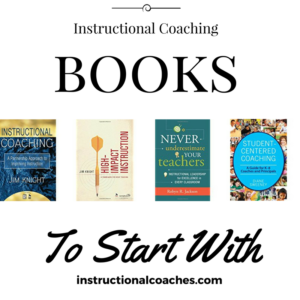Just starting out as an Instructional Coach? Wondering where to start?

In The Beginning: Getting Started As An Instructional Coach
To break down the isolation that many teachers experience in their classrooms, schools are using instructional coaches as a key tool to help teachers adapt their instruction to implement the Common Core standards in Math and English Language Arts.
In starting out as an instructional coach I was VERY nervous. I didn’t know where to start. My school, and most schools in our state had never had Instructional Coaches. This was a new concept for me. So, I started my research. I had no idea really of what an Instructional Coach did on a daily basis. I just knew that an Instructional Coach helped teachers and students. Instructional Coaching is fairly new in our state. In leaving a classroom that I had been in for a few years where I knew what I was going to be doing every hour to not knowing what I will be doing at 10:00 am on a daily basis was my biggest anxiety. I was not sure what my role would look like. Boy did I have a lot to learn! Was I just a helper to the teacher? Did I work with individual groups of students? Was I suppose to run interventions and organize data? I didn’t want to be seen as a glorified, highly paid associate. I wanted to make an impact on teachers and students, but didn’t know where or how to start. I contacted a friend that was an Instructional Coach in another state and shadowed another coach in a larger district that had 7 years of experience.
Good Reads:
My superintendent suggested starting out with the philosophy of an Instructional Coach. I found a few books that I would highly recommend if you are just starting out as an instructional coach, wondering what an instructional coach does or are thinking of becoming an instructional coach. Here are a few of my recommendations that really helped me get started.
Book #1: Instructional Coaching: A Partnership Approach to Improving Instruction: By Jim Knight
This is a GREAT book to start with. Together, myself along with the 2 other new coaches in my district completed a book study of a Jim Knight book called Instructional Coaching: A Partnership Approach to Improving Instruction. I would highly recommend starting with this book. It describes the “nuts and bolts” of instructional coaching and explains the essential skills that instructional coaches need, including getting teachers on board, providing model lessons, and engaging in reflective conversations.
Book #2: High-Impact Instruction: A Framework For Great Teaching: By Jim Knight
If you like the first book by Jim Knight I would also suggest another one of his books called High-Impact Instruction: A Framework For Great Teaching. In this book, Jim Knight presents the high-leverage strategies that make the biggest difference in student learning. Featuring checklists, numerous observation tools, and online videos of teachers implementing the practices, this revolutionary book focuses on the three areas of high-impact instruction:
- Content planning, including using guiding questions, learning maps, and formative assessment
- Instructional practices such as the use of thinking prompts, effective questions, challenging assignments, and experiential learning
- Community building, in which you shape a classroom culture that promotes well-being, creativity, learning, and high expectations

Book #3: Never Underestimate Your Teachers: Instructional Leadership for Excellence in Every Classroom: By Robyn R. Jackson
In this book for school leaders, Jackson presents a new model for understanding teaching as a combination of “skill” and “will” and explains the best ways to support individual teachers ongoing professional development. To move your school forward, you must move the people in it. If you want a master teacher every classroom, you must commit to helping every teacher be a master teacher. That work begins here. This book describes understanding the possible reasoning behind the resistant teacher. This book is a MUST read!!!! The skill vs. will method will help you answer two simple yet important questions:
- How much can that person rely on his or her skills to complete the task?
- How much does that person really want to complete the task?
Book #4: Student-Centered Coaching: A Guide for K–8 Coaches and Principals by Diane Sweeney
I used this in my 2nd year, but it would be good to read in your 1st year. I have both versions. This is my ALL TIME FAVORITE BOOK!!! This book really focused me in on the “what” I should be doing and the “how” to do it. I LOVE the concept of focusing on student data to take the pressure off of the teacher. In focusing on student data and what the students can do will eventually lead to a change in practice.
Student-Centered Coaching is grounded on the premise that school-based coaching can be designed to directly impact student learning. Shifting the focus from “fixing” teachers to collaborating with them in designing instruction that targets for student achievement makes coaching more respectful and results-based. The book also underscores the critical role of the principal in fostering a culture of learning. Each chapter includes:
- A model for designing and implementing student-centered coaching
- Data-driven coaching tools and techniques focused on student learning
- Specific practices for leading a student-centered coaching effort
Elementary Version: K-5
Secondary Version: 6-12
What good books have you read that have helped get you started as an Instructional Coach? I would LOVE suggestions!
*This post contains affiliate links.




